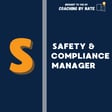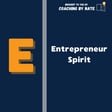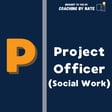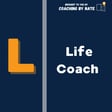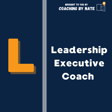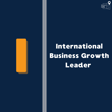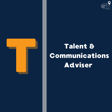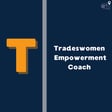Become a Creator today!Start creating today - Share your story with the world!
Start for free
00:00:00
00:00:01

Technical Director: How Jamie's one networking question changed his Career and his life
Sometimes asking the right question, to the right person, at the right time will change your career entirely. In this podcast, you will learn the strategies Jamie used to change his career and how he tested others. From aviation simulation to R&D, animation and teaching, Jamie has a fascinating journey.
https://www.thecareerchangecoaches.com/
Transcript
Introduction to A to Z Jobs
00:00:05
Speaker
Welcome to A to Z Jobs, the podcast that delves into the fascinating world of careers, one profession at a time. In each episode, we'll deep dive into a specific profession, exploring its history, requirements, challenges and rewards. So get ready to expand your horizons, challenge your perceptions and discover a world of possibilities. I'm Roxy. And I'm Nate. And we're excited to host you on this journey.
Insights from Jamie in Film and Animation
00:00:28
Speaker
In this week's podcast, you'll meet Jamie. Although he's currently working in the film and animation industry, he provides insights into how an open mind and asking the right questions can push your career in multiple directions. Hi Jamie, welcome to our podcast. Hi Roxy, yeah, great to be here and thanks very much for the opportunity. Thank you very much for giving up your evening. Let's dive straight into the first question. What do you do for relevance?
00:00:56
Speaker
So what I do is I work for an animation studio as a technical director. So I guess you might ask, what does that even mean? A technical director is a very, it's a term that means many different things in different industries. So I think one of the important things is kind of established, I guess, what that is. I really see this in an animation context as you're really the bridge between artists and developers and productions. You're kind of like that in-between person who kind of makes their lives
00:01:25
Speaker
a bit better. And that's kind of most of what you're doing. There's kind of like three, I
Role of a Technical Director
00:01:30
Speaker
guess, main things that I would consider. The first one, I guess, is that you're trying to make their workflow as smooth as possible. So anything that is annoying them or anything that you see that has issues, they can kind of raise that and you can kind of make their life a bit better. And then the second part, I guess, is to kind of fix
00:01:47
Speaker
think is going wrong, you're kind of that first point of call who knows all the technical details about what goes on behind the scenes and kind of be that extra support for them. And I guess the final piece is what most people think of when you're kind of going to this kind of role, which is a lot about development. How do we develop the features that we need stylistically for the specific show so that I can build the tools for my artists? So I guess that would be the three main things that I do on a day-to-day basis. So yeah, so hopefully that provides a bit of insight
00:02:17
Speaker
That's brilliant. So if you were to take somebody like for our audience in particular, like an animator, a person who animates the entire character, you're the person who supports that person animating the rig, animating the muscles, animating the hair and everything to do with that character in certain softwares within the visual effects and animation world. And that is.
00:02:43
Speaker
the supporting, the tools building, the development, the debugging, and the technical knowledge on that side of it. And I think that's wonderful. I've always marveled at that kind of job and think I don't know if I would have enough patience for it. It's a lot of customer service and a lot of technical knowledge at the same time.
00:03:06
Speaker
It sounds like there's a lot of problem solving as well involved in that. So what for you then is an average J? What does going to work look like for you?
00:03:18
Speaker
For sure, yeah. So basically, I think that's exactly correct. There's a lot of problem solving. There's a lot of wrangling, a lot of different things, because one of the fun things about being a technical director is that you never really know what's going to come up, what urgent things might happen. Or if nothing's urgent, what you can actually have the opportunity to work on. So a lot of times, I guess, when you're thinking about what the day-to-day is, you can probably just look back, I guess, a bit about some of the other days I've had maybe this week.
00:03:44
Speaker
just to figure out what that might be like. So oftentimes for me, I'm either in two modes. I'm either on
00:03:54
Speaker
with any problems that they're having at the moment. Or I could be, I guess, on more of a development mode, where I am much more focused on my own tasks to try to accomplish whatever I'm doing at that point in time. So I guess we start. Let's delve into the support side. And then later on, we can delve a bit into the development side to figure out what that might be like. So let's say I'm going to support week. One of the things that you'll probably hear from almost any studio is that you'll have an infinite number of tasks that almost never ends.
00:04:24
Speaker
So a lot of the time, yeah, part of, I guess, my job or maybe even my manager's job or a team of us will be to figure out what is actually important. So a lot of, or part of my day would be about negotiating, I guess, with department leads, department suits, myself, as well as my technical leads, basically, what is actually important? What is like the most important thing on the floor? Is it something production?
00:04:49
Speaker
And if it is, those are the things we'll be tackling first. So probably the beginning of the day, that's the main thing about figuring out what am I actually planning to tackle and then how am I going to get there. And let's say I'm tackling an urgent problem. A lot of it will be working with the artist directly or whoever has raised the issue so that I can get a really clear picture about what they actually need, what the
00:05:12
Speaker
outcome they want is. So then I have something that I can actively work towards. And then as I'm kind of going through they just liaising with them to make sure that
00:05:22
Speaker
I'm on the right track and eventually kind of getting to that resolution phase where they kind of say, yeah, that is kind of good. That's where I want to be. So if I want to support phase, I'm doing a lot of this, I guess, management of priorities and then trying to figure out what I want, how to get to the end of as many tasks as I can, and then really trying to see, I guess, yeah, what's important, what's not. That's a really big part of that. Does that kind of make a bit of sense for the support side? Or do you want any other questions before I jump to the other side?
00:05:50
Speaker
No, it definitely does. It's a really hard thing to do. It actually takes a lot of work experience to know what a priority is and what it isn't. So you kind of have to go from a technical assistant level where you're learning what the priorities are and you go through all those stages of knowing kind of going down a rabbit hole of what is a priority to understand it, then becoming a technical director where you
00:06:15
Speaker
you're like, okay, I get this, this artist just doesn't know that there's a plugin for that, or this artist has actually just broken this rig or, you know, to the bigger side of stuff where it's actually like, well, actually, there's a big significant problem with the pipeline here and how you would do it and all the different stages of support that you could go through.
00:06:38
Speaker
Yeah, I guess I could probably riff off that. So I guess one of the things, I guess, is probably more concrete examples, I guess, for what that might look like. So I guess I talked about how you have managing priorities and working with the client to figure out what they need, which I guess sounds like a very generic thing outside of the animation context. So let's take it back in to some of the problems I might be looking at. So some might be, as you mentioned, the artist may have, in their scene, done something that is
00:07:08
Speaker
that incorrect issue happened, and then I'll go back up and solve it. It might also be problems where the actual tools that the artist uses aren't working. So in that case, it's really just going back and figuring out how far I'm going to go back in time to find a working version so that I can figure out what changed between then and now so I can get back
00:07:29
Speaker
to a workable state. And the other ones might be something like someone else or some other area has broken something for us. And then it's really just figuring out that liaison with like, okay, well, how do we get to a workable state from there? So I guess those are some examples of what day-to-day issues we might be facing on the floor that might help.
00:07:50
Speaker
That's great. It sounds like there's a lot of soft skills involved there as well. You're doing a lot of stakeholder management, not just the customer service. You're having to go back to people that have potentially broken the tool downstream. You have a bit of a chat with them and manage that conversation as well as the teams around it. So I can imagine that it does get quite challenging.
00:08:16
Speaker
Are you feeling inspired by everything you've learned so far? Keep that momentum going with our four-part Career Change Made Easy course. Dive deeper at thecareerchangecoaches.com. Now enjoy the rest of the podcast.
00:08:31
Speaker
Yeah, I guess there are a lot of soft skills. I think the soft skills make your life much easier. So you don't need to necessarily have soft skills. But if you have the soft skills, then you're much more likely to have that communication so you're solving the right problem. I think if you're lacking the soft skills, you'll be able to solve the problem. But you might not be able to solve the actual problem the artist is facing. So they're not necessarily the same thing.
00:09:00
Speaker
Yeah, you definitely have to have that level of understanding to then add on the soft skills of where it goes. So you've got the support side of things. What's the other side? So the other side, I guess, is more a development kind of workflow. So basically, how do we
00:09:21
Speaker
find some new feature, a new stylistic look that the film is going for. How do we actually work towards that? So this is actually very different, because I feel like when you're on the support hat, you're very like a firefighter. You're trying to basically put out fires as much as you can and try and get to a manageable pace. Whereas I guess when you're in development, you're
00:09:45
Speaker
the opposite because a lot of your stuff is very planned like you probably planned that at the beginning of the show this is all the things that we need to to do to make sure that you can start so when you have that kind of mindset when you actually are working on it you can dedicate very specific time loss to it
00:10:01
Speaker
So one of the things that might be relevant to your audience is that this kind of follows a sprint cycle. So very similar to a lot of programmers or developers, you'll be very familiar with the sprint. So what we'll be doing is we'll be doing that whole sprint planning about how much we actually want to do. We'll be breaking down tasks into manageable chunks so that we can make sure that by the end of the sprint, we'll have accomplished getting closer to that goal. And we kind of see that everything we wanted to do, we kind of completed. So we can kind of wrap it up to move back onto support and really just kind of
00:10:29
Speaker
Yeah, just really getting that whole system engineering process, getting to the requirements, getting to the planning, getting to the management, getting to the extra doing, testing, and so on. And yeah, so it's a pretty, I guess, standard development workflow. But it allows you to, I guess, be much more focused on how you do it and make sure you kind of do it right, which I think is one of the key parts. And I guess the other final bit I can talk about dev is that
00:10:55
Speaker
Because if you're in a team, there are many different things that need to be done. So one of the things I always encourage people is that if we can
00:11:08
Speaker
work on areas, you can work on areas that you're familiar with, and that's really good, you're very specialist. But you can also work on areas that you're not familiar with at all, and those things can open up your whole skill set. So you can be, you have more transferable skills, you have more knowledge around the whole system, so you can bring things together. So when you get to these steps, you kind of are given these opportunities to kind of choose what areas you might want to be in, as long as you have that impetus to let people know that that is something you want to work on. So it's super important for Dev.
00:11:38
Speaker
It's definitely the way the visual effects and animation industry are moving because there were specific technical directors for every department, so character effects and effects, which is your background. But then moving into what is called a pipeline TD, you work on everything to do with the entire pipeline as much as possible so that you understand how each thing feeds into every single thing.
00:12:01
Speaker
And you open up that broader support and development hats and understanding so that when you do build something for the ecosystem that is the feature film that you're trying to produce, you understand the full output of what's happening there. It's a wonderful way of thinking, I think. And it's always one that you've always done even before you became a pipeline TV, for instance.
00:12:28
Speaker
And you mentioned a team. So what does that look like for your department? Is it how big would a team be on a film and how big is a team for the development side as well?
00:12:38
Speaker
Yeah, sure. So I think generally your teams, they're very, as Rox mentioned, they're very departmental focused. So each of us are kind of focused into working on specific departments, which I guess in our particular pipeline are very dedicated to tools. So one team maybe with focus on Maya, one team with focus on Houdini, and we're moving towards that kind of approach, which is kind of cool. So a team might be something like anywhere between, I guess,
00:13:05
Speaker
three to 12 developers, so it's probably a small-ish team. And those kind of developers are working towards supporting everything that the team needs. Does that kind of give you a bit of a gauge of scope? I guess, actually, maybe I can probably expand a bit more. So let's say you have a film, right? So oftentimes, when we're talking about an animation studio, we'll have all the different departments. So you'll have, you'll go from,
00:13:32
Speaker
side, so the global side, so we're going on characters, props, set these environments. So you'll have modeling, rigging, and surfacing. Then you'll be moving into more short departments, so layout, animation, effects, char, effects, crowd. Then you'll be moving on to lighting, and comp, and so on. So there's a lot of different departments which all, I guess, make up the pipeline, as we would call it. And each of those would have their own group of TDs to support the team.
00:13:58
Speaker
And then when you're doing the development work, do they all pull together and do that as well, or that's still very siloed? Are there any support in that particular tool? Generally, we're quite siloed and quite specific. So one of the things, I guess, about working in the animation industry, or at least what I have my experience, is that it is quite, you're working upon a support specific department doing that work. So it is generally,
00:14:23
Speaker
get siloed to your department and then when you're working on development even more siloed towards the particular projects you are working on. So I might be working on one feature but another person might become a completely different feature even though we're in the same department but that's my key focus I guess for the next month, two, three, whatever how long it takes.
00:14:40
Speaker
And those features have different aspects. So there could be one that have different layers of what it's trying to look like. For instance, Jamie works for the creature department. So in one movie, they could be trying to develop an entire animal that has a lot of animatronics within it and a lot of things that need to move and function.
00:15:00
Speaker
And the other movie, they're focusing more on the knives and forks and food and situations within that. So it's sort of manipulating the software that Jamie's using, which is Houdini in this instance, and making it work as well as possible for the artist in an easy solution-friendly way.
00:15:25
Speaker
Which is awesome. The question that's sort of burning for me, and I know this is a really interesting answer to this one, is how you got started.
Jamie's Career Journey
00:15:33
Speaker
Like, where did you start? Because I know it wasn't in the animation industry. And what was that career journey for you?
00:15:43
Speaker
So my career journey has been an interesting one, I guess you could say. So before I started my current role, I was not in the animation industry, I was with the defense. And the defense industry is a very different scope. So I was more in the engineering through a simulation, by simulation specifically. And when I was working
00:16:05
Speaker
in a defense engineering context, one of the things I was working on was mostly project acquisition. So how do we do a major project? How do we get it from start to finish across the finish line? And these projects are quite lengthy. And I guess every different industry has a different definition of what lengthy is. So I had a rapid acquisition project, which was about seven years from start to finish, which was still rapid because it was much quicker than other projects.
00:16:36
Speaker
process to make sure that we kind of went all the way from requirements, all the way to the final delivery of the product. So it was a very different, I guess, scope of work and a lot more, I guess, system engineering, project management, that's kind of, I guess, where my role would be, but had a very high focus on simulation.
00:16:52
Speaker
And that's where I started to develop my passion for simulation as a concept, doing a master of simulation. And that led me to think about, if I'm doing simulation for training, what's it like to do simulation for entertainment? What's it like to do simulation for decision support? And that's what led me towards looking at the animation industry as a potential pathway going forward. But I guess one of the interesting things about
00:17:17
Speaker
how I even got to this animation industry in the first place was that it was more like a serendipitous event. So because I was in simulation, I was going to simulation conferences. And I think one of the conferences I did go to was SIGGRAPH Asia in Hong Kong at the time. And I bumped into one of the recruiters of film, like film studio companies.
00:17:38
Speaker
ask the question, like, oh, do you guys do anything for engineers? Because I'm like, obviously, engineering and animation, there are two completely different things. So there's obviously no pathway as a system engineer to go into something like animation. And I think that's when I kind of learned that, no, actually, there are positions. And that if this was something I wanted to pursue, then I could contact them in the future, especially since they were locally in Sydney.
00:18:04
Speaker
And this kind of random event that occurred many years before I even actually applied was what led me to eventually then apply and figure out what is this thing, how can I apply, what is available when I wanted an opportunity to change. So that's kind of like that
00:18:24
Speaker
long-ish journey, I guess, to figure out how I even got to the industry. But even though I was interested from a simulation perspective, it was probably that meaning and that question that like asking the question, is there an opportunity that led to actually jumping and taking it? Brilliant. I love stuff like that. It's one thing that can kind of earworm itself into your brain and somehow change your life somewhere in the future.
00:18:53
Speaker
So where did you go next? So after, I guess, I had that inkling, I went from what I was doing in my old role to move into my current animation studio that I'm in. It wasn't a direct pathway, I guess, to where I'm working as a technical director. So I did start in research and development first, because a lot of my skills were more of a system engineering background. So it made more sense as an entry point. I don't think it would be
00:19:21
Speaker
possible necessarily at the time to make that jump, or maybe because I was already kind of offered an opportunity in that space, it made more sense for me to start there. I didn't really ask too much at the time. But then yeah, I did research and development for about three to four years at my current company. And then after that time,
00:19:38
Speaker
I kind of wanted to explore something a bit different, I guess, more close to, I guess, what I was envisioning when I was interested in simulation for entertainment. And that's kind of where I started approaching ideas about coming in artists for a while and effects artists. And I was able to kind of work towards becoming a character as artists for a show, and then moving on from there later on a technical director. So that's kind of like, I guess, my main pathway through the company.
00:20:06
Speaker
And just for our audience, what is a character effects artist? So a character effects artist, I guess you can think of, they're kind of, many different studios will classify them as different things with different specialties. But the main thing I guess I would say that a character effects artist does is they kind of work after animation.
00:20:25
Speaker
And the key thing that they're doing is working on making all the clothing simulations, all the hair simulations, all the fur, all the wind. That's kind of their key focus of taking that animation and making it look really good and adding that secondary dynamics into everything. It's brilliant. I feel like they're the people that add the extra bits, you know, the cloth that moves, the cape that moves, the hair that flicks in a certain way. It's awesome.
00:20:50
Speaker
So was it a straight forward path back into the sort of technical world or, you know, how did, where'd you go from there? I guess one of the interesting things I guess about each, each time you make a shift, I guess you could think of that. I was kind of shifting from being an assistant engineer, shifting to be a R&D developer, shifting to be an artist, shifting to be a technical director. Each of these roles, even though some of them are in the same company are actually quite different.
00:21:20
Speaker
you have very different demands, very different workloads, very different, I guess, job descriptions about what you're doing. So every time you kind of make that shift, I guess for me, it was a lot about thinking about
00:21:34
Speaker
What am I experiencing? Because I had a comparison. I had a reference point of my previous job. I could say, oh, this is really different because of these things. And these things are the things that I really enjoy about this particular role. And these things, I think, could have been better from what I've learned from my previous role. So you're always building, I guess, your internal mindset of what you actually value or what you think is important in a role.
00:21:58
Speaker
I'm not sure if we think about it too much, but I think the more you kind of move around and try things, the more you kind of get to the idea of what might be the thing you want to do for all the period of time. And I mean, every time has a moment. I mean, I could say that for all those positions, I really enjoyed certain elements of it. And over time that might change. I may enjoy different elements or I might not enjoy it. And that can be that impetus you need to change.
00:22:26
Speaker
It's the building of your core values and the changing of your core values. And in every podcast, it is the same theme and it's wonderful because it means every experience that you have develops a pro and con that helps you build the values that you want to in your life and decide which career path you want to go on, indicating that you never have a straightforward career no matter what. And it will always create that wonderful path of where you're going to.
00:22:56
Speaker
All of it. And there's also that that open mindset as well, like you're taking on these new these new roles, these new challenges and just being open and learning what you can. I think that's that's also important, particularly when you're talking about like that, that that decision to shift was
00:23:18
Speaker
based on like a conversation at a conference, you know, a conversation that may not have happened if you weren't going in with that open mind, you know, taking the opportunity just to go, Oh, actually, well, I've got you can I just have a quick, quick chat, you know, that kind of conversation that they're the ones that that do that do make make the career changes possible.
00:23:37
Speaker
It's meaning that one person that can change your life, that networking and communication, that conversation that you have with someone that can stick with you and spark a new journey, which is awesome.
00:23:53
Speaker
And from knowing you for the past couple of years, Jamie, I think it's that little spark of optimism that you always have, no matter what, in every situation when it feels like the film that you're working on is on fire or there's a lot of tasks that are happening, you're still like, we're gonna get there, Rox, it's fine.
00:24:14
Speaker
With your, so you've had sort of a lot of little shifts and you're trying different roles, was that all in one company or you had to make sort of dramatic changes to get that experience or were you lucky enough to, there were smaller shifts?
00:24:29
Speaker
I guess I could say that when I was going through, so the major step, I guess, was from between industries. I kind of moved from defense, which is like a very different mentioning side to animation. Like it's quite different. I think after that point in time, a lot of this was internal shift. So it was a very different, I guess, perspective coming from.
00:24:49
Speaker
I guess, if you're moving between companies or if you're moving between industries, it's quite a different experience. But I think one of the highlights, I would say, for my path, which is a very non-traditional path, I think,
00:25:06
Speaker
I'm 100% non-artist trained. I have no previous training as a Houdini artist or anything like that. So when I kind of made that shift to become an artist, that was quite a big shift, which was made possible because I knew people from my previous role. So one of the things that even if you want to get to somewhere, you don't necessarily have to move there in a straight one path. There are many pathways where you can kind of like open some doors, which may open up other doors,
00:25:34
Speaker
which you don't even know that it will be in the future. And, yeah, taking those opportunities is really something that the more, I guess, you kind of are looking out for them. You don't know if they'll happen. They might not ever graduate. But if you're open and you're kind of happy with where you're at, you can find them if you need to.
00:25:52
Speaker
And I think also recognizing sometimes you need to take a step backwards in your career to make that pivot. It's not always gonna be progressing forward. Sometimes you need to take a step sideways, take a step back just to change that direction. And then in terms of, so you've said, okay, you've gone on a very non-traditional path. So if you were to take a traditional path, what would that look like? And how quickly do you think you could have,
00:26:19
Speaker
If you had that clear goal right from the beginning, how quickly could you get to where you are now? I think if I had a, if I wanted a really clear goal, like let's say when I was really young, I had this vision of joining an animation studio and then becoming a technical director, for example, there'd probably be, I guess the question is, is it from my own experience? Is it from the lack of experience of like motivation and drive? Which would it be?
00:26:46
Speaker
It's a very interesting question. Okay. So let's go with both. So let's go first one from my own experience. Okay. So let's say if I came back in time with my own experience and have now one of the things that I probably would do is work a lot on my portfolio.
00:27:07
Speaker
So I think one of the most important parts if you want to join the animation industry in either artistic or technical director form would be having the skills. You need to be able to demonstrate that you can do the skills, in my case, Houdini, so that people can go, oh, yeah, this person knows what they're doing, and they can do the job that I want them to do, which is
00:27:26
Speaker
in my mind, more important than a degree. It's more important than a lot of other things. If you can show that you can do the work, that's really the key from an animation perspective, which is one of the best things about this industry. You don't need to do it for your degree necessarily to get in. They may help you get connections and they may help you build the right skill sets and mindsets. But really, at the core of it, if you can do the job and you can show that you can do it, I think that's the most important part.
00:27:54
Speaker
And that's where I would do if I had my own experience bringing it forward. Should I go into the second part if I had no idea? Yes, please. OK, so if I had no idea. And the other thing I would do if I had my own experience I know now, I would be asking questions. I think meeting people, asking, how do I get in? What is available? Because if there's not much available,
00:28:20
Speaker
you're probably not getting in no matter how good you are so it's like knowing like the possibility of that um so yeah so if let's say i don't have my own experience coming in uh i think a lot of it would be
00:28:33
Speaker
a lot of people have a vision that they can kind of make it if they're keen or make it if they're motivated. I think that's what a lot of people do. And I think like the traditionalist approach is to kind of go down a degree path because I think a lot of people from my generation, that is the path. You have to get a degree, you have to do this. This is the gate. And if you don't do that gate, then you can get through. And especially for people who are engineering trained, you think that that gate is
00:29:01
Speaker
mandatory because all engineers have had to go through the gate. So the message that I can give to people on the podcast is that you don't have to have that gate. And then the closer I could, the more people I could talk to, the more I would know that that gate doesn't exist. So I think that would kind of be that self-discovery part, that talking would be a much more important part because I don't know what I don't know.
00:29:24
Speaker
It is, it's that investigation, that talking, getting to know as many people as possible, asking all the wrong questions before you work out what the right ones are. And I used to get so frustrated when I was a graduate or before graduate, because people go, go and talk to the person, but what do you talk to them about, honestly? But at the end of the day, asking all the wrong questions first teaches you what to ask, right? Because people actually reply to you when you ask the wrong questions.
00:29:51
Speaker
direction and they steer you in the right direction a little bit. And those are the people you want to get to know. Those are the people that push you in the right direction in your career and move you forward. And, you know, if you're not going to go down the degree route, which in some cases, and especially the visual effects industry, a lot of people have the degree. We want more than the degree in some, you know, we want to see how you stand out. We want to see that personal project. We want to see what you've created in your showreel or
00:30:19
Speaker
or that development or tech piece that you've produced on top of what you've done in your
Showcasing Skills in Animation
00:30:25
Speaker
degree. So if you go around it a little bit and you have those personal and soft skills and those communication skills and you just stick your neck out there with that positive attitude.
00:30:36
Speaker
I think you're right in both roads. I've seen both people do those things very well. Within the technical director position, what is your favourite thing about your job? I would say the favourite thing about my job is probably the ability to
00:30:55
Speaker
I guess it's the ability to help others. I always think that one of the positive things about this role and I guess what I bring to the company is about being more of a false multiplier. I don't think I'm necessarily that good or I'm not necessarily that
00:31:11
Speaker
that proficient or technically proficient in a lot of different areas because as a technical director, you cover a lot of areas. So the key benefit you give is that you can make other people do better work. So I think when you kind of reach those points and then you can kind of see that, I think it really helps. And I guess one of the other things is
00:31:30
Speaker
It gives you, I guess, that opportunity to be a bit creative. Like, you're problem solving a lot. So the way you kind of work around things and when you find the solution that's really, like, really annoying but really, like, very niche and very specific but you can solve it, you get that satisfaction that, you know, you solved this thing that was, like, really hard and it feels good when you kind of, like, go through one of those and you kind of make that happen.
00:31:57
Speaker
I think you're so humble. The amount of time and effort that you put on people and the technical knowledge that you have, I can speak for you and tell you that it's amazing. I don't know how you fit what you do in a day. That's just for me being a part of your team early on in the years.
00:32:18
Speaker
And I know from your team's feedback, the amount of time and energy that you put into the support, I don't know how you tick off one task on your day, because if it was me, that would be one day gone on each person. So what are the negatives in the role? Is there anything that you dread doing or something will pop up and go, oh, not this again?
00:32:40
Speaker
I guess one of the things, and I think it's probably something that's relevant, I guess, to this podcast, is a lot of the times you can do really good work, but I think one of the challenges of any role, and I guess single instructors know, I guess also the same, is that you can always hit this point, depending on how you see work, that you may be doing, I guess,
00:33:07
Speaker
similar things like we get to a point of mastery and like learning is like this really big plateau when you're kind of learning and when you hit a mastery point you're always kind of like okay like like is this different is the same as kind of the thing like this stretching me um i think one of the challenges of most roles is this uh and i think the mindset definitely helps um we have the right mindset about what work is and what work isn't
00:33:28
Speaker
So I think one of the downsides probably would be that oftentimes you can get into this loop, especially when you have, I think I said, there's an infinite number of tasks that you'll never get to the bottom of it. And a lot of people, when they go into these things, they're like, I'm going to get all these tasks down to zero. And inevitably, whenever you get to zero, there's another task that comes in by the time you're about to get to zero, and then it's back at one again. And I think if you have this continual drive of never completing, that can really rub people the wrong way.
00:33:58
Speaker
So I think that's probably one of the biggest disadvantages of a role like this, is that you will never get to the bottom of your task list. Try and be okay with that. I don't know if I can do that. Just create a smaller list to the side that you know you can tick off. So you've got a finished list at some point.
00:34:17
Speaker
off the priority list. So we've talked a lot about, you know, the different paths that you can take and the advice in an essence that you would give. So my next question would usually be, well, what advice would you give to somebody starting out? But really, are there any kind of resources that you would pass on or sort of steps that you you kind of wish you'd taken that you would give to somebody starting out?
00:34:46
Speaker
OK, so I guess if I had to give resources or tips. So I think if you're trying to get into Houdini, I think CGWiki is a very good resource that is free, openly available, and is very powerful at teaching a lot of the core basics of what you might need in Houdini. And that's probably the main thing that I can give. If you're going down a technical director path, a lot of the work that I do is in Python. So software development skills are super useful. So there's a plethora of software development ways you can get in. I use Learn Python the hard way.
00:35:19
Speaker
that's kind of the one that I use to learn Python from scratch, not having any experience from there. And I think one of the key resources would be finding, I guess, some community, some community that helps you create. I think if you have something to work on, like a project,
00:35:34
Speaker
you're much more likely to create something meaningful rather than just doing a series of tutorials or doing a series of things that you're disconnected from. So really, if you can find something that drives you to create a project or portfolio, that will really help in making something that you can really show, that this is like something that comes from your own heart, that this is what you want to do, and you've made it successful.
00:36:02
Speaker
Sorry, I was just going to reinforce doing that project work, doing that community work. Like it's motivating in itself because you're working on something real, but it's also that network building. It's also those incidental conversations we were talking about before, those types of conversations where your eyes will be open to different areas. So I think I agree completely. I'm a big supporter of volunteer work, community work, project work.
00:36:27
Speaker
Get out there, do as much as you can if you've got the capacity to do it. And definitely share your issues. I think that's the key one as well. So if you're doing a project and you're having problems.
00:36:38
Speaker
find a community that you can ask these questions. Because by asking questions, you might think that that will make you look worse, but actually it will make you better because A, you've asked questions and you connected with community, and B, you've also now learned that knowledge with the best possible way, because sometimes you struggle and you come up with a solution, but you might not have the best solution. So don't be afraid to ask questions. It will actually help your presence in the community. Definitely. Especially in such a creative, different world, like the fact that you can
00:37:08
Speaker
get feedback and go away with it is such a wonderful way of moving forward. But it also means that in that community, when someone else asks that question, you can come back with that. Well, you can do it the long way or the easy way. Do you have any advice for anybody trying to find their community? Is there, you know, like you've mentioned, you know, CG Wiki, are there any kind of forums or anything that anyone can get involved in?
00:37:35
Speaker
So there's pizza forums. There's a side effects forums. I think that will help a lot of people. There's a few groups that you can join. I think there's a lot of meetups for Houdini. There's a lot of meetups for animation groups as well. I wish I could say I could actually attest to a lot of them. I'm very fewer than myself, I guess, because of that, which is, I guess, that other pathway that if you aren't going down the community research path,
00:38:00
Speaker
try and get your foot in the door somewhere. You can work your way from inside the company like I did as well. So that's a completely different viable path. If community and those projects are not really your thing, you can find another pathway through just getting in the door somehow in any of the studios. And once you have that one year experience on your belt, that will help you tremendously in securing another job that you actually want to focus more on.
00:38:25
Speaker
And always communicating. Don't be afraid to explain that that job is not what you're looking to do in your life. You know, talking to your manager about what other jobs there are in that, in that company and where you can get involved in, because that's where you are not afraid. You know, in the R&D realm, you made those steps to move into the character effects world by asking those questions and then moving into the TD world as well as those questions, those
00:38:53
Speaker
sort of earwigs that you pop into your manager's brain about the future, or even being a little bit more assertive of, this is what I want to do, how do I do this? Could you please help me? What are the pathways? And being more specific about it, which is awesome.
00:39:08
Speaker
I can riff on that as well. So one of the things that if you go down the let's get a foot in the door route, one of the best things is you'll start to learn who the teams are, who manages them, and like what kind of area you want to go in. So I think one of the hardest bits about joining a new company in any context is you don't know the people. So you don't know what the team will be like. And going to work, I think, regardless of like,
00:39:33
Speaker
what you're doing, I think your teammates have a big impact or your team as a manager have a big influence on how much you enjoy that job. So even if it might, let's say I was doing something completely different that I didn't necessarily really want to do, but I kind of wanted to do, having a good team could be better in that context than being in the job I dream of, but has a bad team, a bad management structure. So there's one benefit of like, knowing the people that you'll be working with.
00:39:59
Speaker
definitely it's the values in the community you know you can be in an amazing job for a year and then the whole team changes and it's just it's not the same anymore it could just yeah it's tough
00:40:13
Speaker
It's a sad feeling because it goes from being almost like a family to suddenly a weird ship. And you can hold on until the ship changes or you can try and move on and see what else is out there and where your new family or your new community is. Which is awesome.
00:40:32
Speaker
So with your background, with your education, and I can imagine you've done a whole lot of different types of education. Is there any highlights, any courses, anything that really stand out that you would recommend or you got a lot of value from? I think one of the tips which I will give is probably
00:40:56
Speaker
There's a lot of stuff that you can do which is like expensive. So like a lot of courses that you do like from universities degrees, they're quite expensive. And they often like are less targeted, but there are a lot of other sites that should offer things that are much more short, much more specific to certain skills.
00:41:19
Speaker
And I think that if you're trying to join this industry, you should be looking for those courses that are very specific about building
00:41:28
Speaker
for my one would be Houdini skills and software development skills. So those would be the courses I would target. University is good because it gives you a big range of skills and a lot of soft skills and other skills you can develop too. But if you're really targeting something more specific, you don't have to spend as much money or time doing the big things. So that would be my main recommendation. There are heaps of good resources, which I wish I could give you.
00:41:54
Speaker
I've been using FireShape a little bit, which is pretty useful for some software development stuff. They're pretty cheap, short areas that you can use as well. I probably haven't found, I guess, the best. I think Side Effects has some really good tutorials. It's a really good Side Effects book that's free as well, I think, on their site. So you can use that to learn all of the basic concepts as well. But yeah, those would kind of be my main things, like try and find some courses that you think are good.
00:42:19
Speaker
Actually, here's probably the better thing because I don't actually have the best resources on hand. I would say investigate, do the research, ask people. This is going to be the first step of you building that networking community that you ask community members who you respect, people who you see. I watch their YouTube video and they're amazing. Let me ask them how they did that.
00:42:38
Speaker
I watch this other person, where did they come from? What courses did they do? Or even Reddit or whatever. There's many places you can start asking for resources. And then before you even jump in, some places will let you try that experience. So you can try it, or you can do a trial. And then if it's like, oh, this instructor really connects with me, I like their style, that will help you a lot. Because if you're not in the style, you're probably not going to do it. So that would be my tip.
00:43:08
Speaker
Definitely. It's all about asking the question. It's something I've faced in my life at the moment with my husband trying to apply for a different role. He called up TAFE and the person on the other end has a broad knowledge of everything.
00:43:24
Speaker
But then going to a careers fair, he actually managed to talk to a person about an electronics course. And she had a wealth of knowledge and gave him the information for another person. So it's kind of breaking that layer of who to talk to and how and trying to spread those seeds a little bit, like for a visual effects person, messaging someone on LinkedIn, for instance, that's in a role that you're interested in.
00:43:48
Speaker
they're all really lovely people and if you reach out to enough of them one or two of them will definitely reach out to you and say well start here or look here or you know start on the side effects forum which for any Houdini user is one of the best places to start and even asking on that forum where do I start you'll probably have a million messages
00:44:10
Speaker
So it's great, it's that networking side but also not being afraid to ask because at the end of the day you don't know and nobody's going to judge you for that. I was just going to say I completely agree and I was just thinking about those internal shifts that you were talking about at work as well.
00:44:31
Speaker
Some people are too scared to tell their manager, actually, I want this other job. But you can remember that these managers are on their own career path. They're on their own career journey too. They empathize with you. It's going to be a positive to have those discussions. So I think it's just remembering that everyone's been as lost as you feel in that moment. And most people want to help.
00:44:55
Speaker
Yeah, I do feel like yeah, definitely for those things like you if you don't tell anyone no one will know So if you go man, I really I really like you're doing the thing like I really wish I was doing that thing But if you don't tell anyone you can do something about it. You're not really gonna get there So definitely good advice that you let people know you need to know if they like you as an employee They probably want to keep you as an employee regardless of what flavor of a player you are as so
00:45:24
Speaker
Yeah, I mean it is a leap of faith that it's not easy to ask these questions, but if you are driven to change career or to at least explore different options, definitely ask. And I think just don't be afraid. You know, I had a very negative experience when I was first starting out in my career.
00:45:43
Speaker
where my manager actually turned around to me quite angrily and said, well, Roxanne, you're in charge of your own career. How the hell do I know what you want out of your life? And for me, it was like, well, shouldn't there be a journey? Like, shouldn't there be an ABC step that you are following to manage me? But 90% of the time, that's not it. That's not how it works. So unless you have that path and that drive to push yourself forward, you're not going to move as quickly as the rest of the bunch.
00:46:13
Speaker
I had to learn that the hard way. I trusted the system until I burst. My manager and I had this wonderful conversation. It's a learning curve I drive on for the last 10 years now of actually going, okay, you know what? She was right. I hated her at the time for it, but she was very right.
00:46:38
Speaker
Before I move on to our last question, which is the quotes, I do need to ask you, you have a passion about teaching that I know about, so where's that
Venture into Teaching and Return to Animation
00:46:49
Speaker
gone? How's that gone? How has the last year been, Jamie? I'm dying to know.
00:46:56
Speaker
So I'll tell you kind of a bit about, I guess, my teaching story. So one of the things that happened last year was I was really motivated to kind of try something different. This was also serendipitous because I think there was a moment where I saw this opportunity to explore, I guess, a teaching option, but it was an accelerated teaching option. This meant that I didn't have to spend as much time studying before I actually was in the classroom teaching.
00:47:21
Speaker
which I thought was a really interesting approach and it was kind of something that when you kind of see these moments or these opportunities come up,
00:47:33
Speaker
I took it, and I think that was a really good idea to take. I did really enjoy my job. I was doing well in my job. There was nothing wrong with my job. I think sometimes people think you need to get to that point where you're like, I hate my job before I move. But I didn't get there. I was more like, yeah, it was pretty good. I enjoy it. Good team, good people. But then when you have this inkling that you want to explore something different, and there is an opportunity, you have a choice to make. And for me, I made that choice to kind of explore that option.
00:48:02
Speaker
So over the past, I guess, few months, I had the opportunity to do an accelerated program where I learned to like, I guess, one semester of master's in a month or two, and then they put you into teaching for about
00:48:14
Speaker
for teaching basically full-time. So you're kind of like doing a 0.8 load, but you're generally teaching whilst you're studying at the same time, which is a really good way, I guess, to test if you're actually going to enjoy it. Because I think if I had to invest, let's say, two years of a master's and then do teaching, it may not have been something I wanted to commit to. But it may have been something I wanted to do but didn't explore.
00:48:41
Speaker
So I think one of the best things about this opportunity was that I could go, okay, I'm going to try this thing out. I'm going to jump into this teaching profession and see what happens. The downside of jumping into teaching profession is you don't have much preparation. So I think it was a bit of a challenge for me to adjust, I guess, my expectations of what I thought teaching would be.
00:49:03
Speaker
generally about teaching people maths and tech in my case, about these concepts and helping them understand to a better way. I've since found that a lot of it's about teaching as profession, I'll say is one of the hardest
00:49:20
Speaker
most rewarding, most challenging, most everything kind of situation that you could ever have. So if anyone is a teacher listening to this podcast, I would say I have the most massive respect for you because you do like the job of a counselor, you do the job as a teacher, you do the job kind of like as a parent or like a behavior manager and you're trying to like do like damage control as well. And yes, you do with parents, you do relationship management, soft skills, you have so many transferable skills that if you are a teacher and you're thinking about a change,
00:49:50
Speaker
you have more skills than you think you can. So make sure that you use that to explore because you have a lot of skills in a lot of different areas, even if you don't think you do. So that's my tip. But for me, the teaching journey was too much of a challenge. I think the expectations were a bit of a mismatch. And I think the key thing I found out was about balance. So my key learning from that experience was that if I was
00:50:17
Speaker
coming home emotionally exhausted, spending my time studying whilst I was at home, then working and then becoming emotionally exhausted at home again and repeating that cycle. That to me was too much of a cost to my actual lifestyle that I wanted to live, like having a wife, cats and other things. So I feel like you need to make decisions about what's
00:50:39
Speaker
And I think that was the biggest, I guess, shock to my sister to figure out, do I value this so much that I'm willing to give up so much of this other thing to do it? And that's kind of when I hit that point where I'm like, I don't think I can because I do value balance. I do value time at home and time with family. So that's the reason kind of why I kind of
00:51:01
Speaker
went back to kind of where I was before with a very different perspective. So my perspective on work now is much more different than my buzz previously. Definitely. And some new skills. You have a lot more new skills teaching teachers. I learned a lot about how to teach. Like if I thought I hadn't had to teach before, I knew nothing. Teachers have a really good way of explaining things in a way that people can understand it rather than talking at people.
00:51:31
Speaker
And you took that risk. I'm so proud of you and watching you do this for the last couple of years, honestly. And when you came to me and said, this is what I'm doing, I, you, you inspired me. I think I was like five months pregnant in the time and you.
00:51:49
Speaker
that month i made a movie a three-minute movie because you i was like jb can do like let's do this um and you know what it's it's what you learn out of those experiences and the fact that you've come back to where you're at and also understanding where your line in the sand is and i'm very particular about that because i've had so many jobs where
00:52:13
Speaker
Um, it sucked up my time with my husband, you know, he's a very affectionate man and he wants to be a big part of my life. And when it sucks that time out of it, it kind of, you can feel it and you've got to know what, what the good part of it is and what the bad part and where you're willing to give up that side
Balancing Career and Personal Life
00:52:31
Speaker
of it. And especially becoming a mum as well. It's even harder now. Cause I'm like, well,
00:52:35
Speaker
I miss out on that time I'm in trouble. So, you know, it's the same with cats and your wife and, and your life and, and also your projects Jamie. Cause I know you've also got, you know, your board game projects and things like that. You know, it's like doing what you enjoy as well as doing what you do for a living. It's hard because what you do for a living sucks up most majority of your life. So enjoy it. So I have to say I'm very proud of you for making that change.
00:53:07
Speaker
I've got one more question as well, so I just wanted to quickly ask, so when you're making these changes, like the dramatic ones, you know, getting to the teaching, how long do you sit on the fence for? And are you making a pros and cons list? Or how do you know actually I'm ready to take this leap, I'm going to do it? What's that process like?
00:53:27
Speaker
So I know of processes that do work. So after this experience, I read a really book called Quit. It's a super good book by Annie Duke that talks to you about how to make more rational decisions about these major life change decisions. So instead of like, at the time, you need to make the decision going, oh, yeah, I'll do it, but I won't do it. Even prior to that, like,
00:53:52
Speaker
when you start thinking about the idea, but it's not reality, you're writing down this list of like, what are these protocols? What are the deal breakers? What am I actually going there to do? And what is the, I guess, the cost benefit analysis if I go down this track or this track, like it's not just from cost, but like from like emotional family balance, like money, all those kinds of things to feature it. So then you can make
00:54:16
Speaker
you've already prepared the decision when it happens. So it's a rational one, less so than an emotional one. And if you have that in your back pocket, when it gets that time, you can make a decision that you made before. The decision might turn out bad, it might turn out good, it might not be anything like you expected it to do. But you know that at the time you made the decision, you made the right decision with the information you had.
00:54:39
Speaker
because hindsight is always gonna change that opinion but you made that decision you already planned it so that's a really good decision process to do and do that going forward but from before then i think i'm much more of a instinctual i guess kind of person you kind of get ideas and you kind of i think there's like a
00:55:00
Speaker
there's this time between the idea and the action, right? And I think if it's too far a gap between when you've got this idea and you actually do it, you're likely not going to do it. So oftentimes, I shortcut that process to make sure that I'm doing an action before it can just delay too much. Because some things do, they're staying in permanent limbo.
00:55:23
Speaker
dreams in the future if they're not reality, so I do do a lot more of that impulsive Intuitive impulsive kind of way for better or worse So even just breaking it down to those smaller steps like you you've got sort of That idea on the horizon, but just making sure you're at least doing a small step towards it Otherwise, it's gonna end up like Roxy's wall with the post-it note of a hundred projects on it. It hasn't quite finished yet
00:55:52
Speaker
The dreams of the future. And you feel good when you do it, though. I gotta say, I wouldn't take it back. So no matter whether the experience is good or bad, the fact that you've done the decision, you tried it, it's kind of out of your system. And you're not... I think one of the things, actually, here's a reminder, you can always go back. So if you have a safety net, which is one of those things that you will include in your decision-making process,
00:56:18
Speaker
you don't have nearly as much risk of everything falling under you because you have a safety net of some description. So if you plan for that safety net in the worst case scenario, it doesn't even really matter if you fail completely, you have a safety net.
00:56:33
Speaker
That's one of the main reasons you never leave a job telling your boss to F off and setting the life on fire, honestly, because you need something, you know, your relationships, your networking, you never know when that person's going to mean something to you, you know, in the future. It doesn't matter.
00:56:49
Speaker
what's happened in that instance you should never send the awful email that is formulating in your head if that's the case it's just one of those you know those safety nets are a good thing because you as a person if you're a hard worker and you've put your time and effort and your life into this job you know the person looking after you and then and the company should acknowledge that and if they happen then definitely never to go back but still don't send that email
00:57:18
Speaker
There's other ways to give that feedback. It doesn't need to burn bridges. Exactly. Never burn the bridge just in case. That's good. Okay, so are there any quotes that inspire you or move you forward or kind of live with you on a day-to-day basis?
00:57:38
Speaker
So I think the key one that I think most people who know me would think that I think every day is a good day is one of the kind of matches I kind of follow a lot. It's kind of the principle that
00:57:50
Speaker
You get to decide whether the day is good or bad. So even if the day is really, really, really bad, it's your mindset about that thing that kind of determines what it is. No one else has the power to do that, so you're empowered to do that. And that's kind of what that mantra, I guess, helps me think about and kind of make that positive outlook, I guess, to the day and to my own mindset.
00:58:10
Speaker
going forward. I'll also probably recommend two books that I think are really useful for people on this podcast. The first one is called The Good Enough Job. This is a really powerful book that kind of talks about a lot of the, I guess, biases about what keeps us attached to jobs rather, or more like a lot of times we think job needs to be meaning fulfillment. So by
00:58:34
Speaker
if we think it means meaning, fulfillment, and money, then eventually it will not kind of achieve all of those things. But if we kind of treat it as a job, as just a job that makes money, then we can, if it finds meaning, great. And then, but we can also use that for meaning outside of work. And the second one I'll leave you guys with is called, I think it's Thai Management for Mortals by Oliver Berkman. It talks about how we only have 4,000 weeks to live. So about how
00:59:03
Speaker
making decisions about how we spend our time, we really need to kind of focus on find out what we actually want to do. And if you want to do those things, you have that timer. So when you decide to do something that is not related to that, you are losing time towards that. And it's all saying that you just have to be super productive. It's kind of saying that you can kind of let go of some of these ideas about doing
00:59:23
Speaker
a million projects, because you only have time to do maybe 20 of them. So let's just focus on those 20, and then the others can follow by the wayside. So yeah, just two interesting books, reads, ideas that I'll give you guys with.
00:59:35
Speaker
How am I going to choose which project? I'm just kidding. I will. Definitely. We're going to have a good list of books. That's awesome. Well, thank you so much for your time. Nathan, are there any other questions that you wanted to ask?
00:59:59
Speaker
No, no, I've got a whole list of resources now. So I'm going to have to check those out. So thank you for sharing, sharing your journey and sharing the insights. It's been fantastic. Thank you. Thank you very much for the time. It's been super cool. It's been lots of fun to just kind of like, to have more hang out with you guys. It's been fun.
01:00:20
Speaker
It's so nice to see you again and talk through everything and find out what happened with the teaching and everything. And I think that's such a wonderful experience. I think also in the industry you're in, a knowledge of teaching will open up so many more avenues, my friend, that I can talk you off about that in a whole other podcast. But I'll leave you to it for now and give you some of your evening back. But thank you very much.
01:00:49
Speaker
You've been listening to Roxy and Nate. Thanks for tuning into A to Z Jobs and always remember it's your career and it's up to you to shape it. So dream big, make bold moves, stay curious and keep exploring. Check out our website at thecareerchangecoches.com for more resources, tools and upcoming training. Thank you for joining us on this journey. Don't forget to subscribe and hit that notification bell so you never miss an episode of A to Z Jobs. Remember your dream career could be just one episode away.
01:01:25
Speaker
Are you feeling inspired by everything you've learned today and ready to take the next step with your career change journey? Dive into our four-part Career Change Made Easy course. We'll help you gain career clarity, understand your transferable skills, and put them into play with application, negotiation, and interview advice. Head to careachangecoaches.com.
